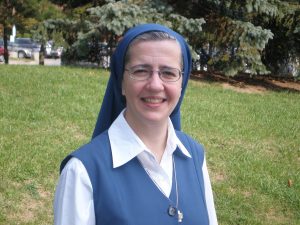The miserable young man felt hopeless. Despite his talents and promising career, his life was a mess. He was drawn to God but resisted, because he didn’t want to give up his sin. He was addicted to lust. Sitting in a garden one day, pouring out his heart in prayer, he suddenly heard what seemed like the voice of a child chanting in Latin, “Tolle, lege!” “Take and read!” Picking up the closest book, a Bible, the young man read, “Let us live honorably as in the day, not in reveling and drunkenness, not in debauchery and licentiousness, not in quarreling and jealousy. Instead, put on the Lord Jesus Christ, and make no provision for the flesh, to gratify its desires” (Rom 13:13-14). Shaken, that was all Augustine needed to read. Those words took hold of him completely and he went through with his conversion. He not only became a great saint, but also one of the most brilliant theologians and Doctors of the Church.
In today’s Gospel, Jesus has just finished the Sermon on the Mount. He tells us, “Everyone who listens to these words of mine and acts on them will be like a wise man who built his house on rock” (Mt 7:24). All of us have heard God’s word. It comes to us in many ways: through the Scriptures, preaching, inspirations in our heart, the encouragement of friends. But how well do we listen? Just because we’ve heard it doesn’t mean we will put it into practice. Advent is a time to grow in our spiritual life. It starts with listening to God’s Word, but our Advent will only bear fruit to the extent we put that Word into practice.
Advent is not some kind of self-improvement program, however, like a new diet or exercise regimen. Those have their value, but as Christians we have a great advantage. Jesus, our Teacher, lives in our hearts through grace. When we read his words in the Gospel, it’s not like reading some ancient sage’s advice on how to live. No, Jesus is teaching us how to become holy. He is alive! Jesus is the Word of God made flesh, who speaks to each of us as our Teacher. And he has also sent his Holy Spirit into our hearts. The Spirit gives us light to understand, and special grace to strengthen us to be holy. The Word we receive has the power to change us. It’s the Rock on which we can build our lives so that when the floods and storms come, we can survive it all.
The first week of Advent is almost over. If you haven’t done so yet, take a little time in prayer to listen to what Jesus is telling you. We usually have one thing in our lives that we should focus on, the one thing that’s most important for us right now. That one thing is whatever will most help us grow in our lives as disciples of Jesus. It could be something big, like Augustine had to face. Or it could be something that seems smaller, but is blocking us from growing in Christ. Focus on that one thing. Don’t try to do too many things, because in the end nothing will happen. Build your life on the Rock that is the Word of Jesus, our Teacher who lives in us and imprints his Word on our hearts.
Copyright 2017 Daughters of Saint Paul
 Sr. Marianne Lorraine Trouve’ has been a member of the Daughters of Saint Paul since 1976. She has an MA in theology from the University of Dayton and has served on the editorial staff of Pauline Books & Media for over 20 years. She is the author of several books, including Mary: Help in Hard Times and Angels: Help from on High. When she’s not writing, editing, or working on logic puzzles, she can be found blogging at www.thomasfortoday.blogspot.com.
Sr. Marianne Lorraine Trouve’ has been a member of the Daughters of Saint Paul since 1976. She has an MA in theology from the University of Dayton and has served on the editorial staff of Pauline Books & Media for over 20 years. She is the author of several books, including Mary: Help in Hard Times and Angels: Help from on High. When she’s not writing, editing, or working on logic puzzles, she can be found blogging at www.thomasfortoday.blogspot.com.

 Andrea Perry is a Project Coordinator for myParish app at Diocesan. Andrea has worked at the Parish Level in Youth Ministry and Adult Faith Enrichment for the past 8 years. She joined the Diocesan team in 2017. As a project Coordinator, Andrea desires to bring the Word of God to others through modern means of social communication, for the glory of God and the salvation of souls.
Andrea Perry is a Project Coordinator for myParish app at Diocesan. Andrea has worked at the Parish Level in Youth Ministry and Adult Faith Enrichment for the past 8 years. She joined the Diocesan team in 2017. As a project Coordinator, Andrea desires to bring the Word of God to others through modern means of social communication, for the glory of God and the salvation of souls. As Diocesan Publications’ Solutions Evangelist, Tommy is committed to showing parish and diocesan staffs how to use our communication tools to their best advantage. He has worked for years in various, youth ministry, adult ministry, and diocesan roles. As an expert on Catholic communication, Tommy uses his parish and diocesan experiences to help you make your ministry effective. To bring Tommy to your parish or for general inquiry, contact him at
As Diocesan Publications’ Solutions Evangelist, Tommy is committed to showing parish and diocesan staffs how to use our communication tools to their best advantage. He has worked for years in various, youth ministry, adult ministry, and diocesan roles. As an expert on Catholic communication, Tommy uses his parish and diocesan experiences to help you make your ministry effective. To bring Tommy to your parish or for general inquiry, contact him at 